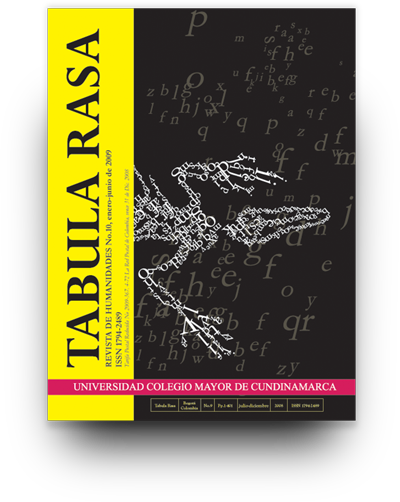
Yolanda Mª de la Fuente Robles ymfuente@ujaen.es Universidad de Jaén, España Eva Mª Sotomayor Morales esotoma@ujaen.es Universidad de Jaén, España Abstract: Information and Communication Technologies (ICTs) burst upon the scene to make accessibility and participation easier to all people for the exercise of their own rights. If we circumscribe to the field of people in […]
Graciela Maglia Vercesi gmaglia@javeriana.edu.co Pontificia Universidad Javeriana, Colombia Abstract: Nicolás Guillén took an autonomous position in the literary field of Hispanic Caribbean in the 30’s, and built an early national hybrid identity as a cultural and aesthetic response to a historic crossroads marked by ethnic whitening, political alienation and economic dependence. Guillén went to the […]
Uva Falla Ramírez ufallar@gmail.com Universidad Colegio Mayor de Cundinamarca, Colombia Abstract: This paper roughly addresses the sense and meaning given to social research in Social Work, its evolution and its incidence in the discipline development. To end with several reflection permitting to understand the need to make research from more integrating and comprehensive designs, where […]
Fernando Rivera fariverab@unal.edu.co Universidad Nacional de Colombia Abstract. Departing from the social representations theory, symbolic axes of Western European imaginaries are identified, which determined the interpretation and categorization of New Worlds during quest and conquest during the first half of the century from its ‘discovery’. During that period theological cosmogonies and symbolic and folkloric cosmographies […]
Alexander Miller nationmiller@bellsouth.net University of South Carolina-Lancaster, USA Abstract: This paper discusses the opinions of sixteen Caribbean scholars on social progression, and concludes that such a thing is really unattainable in the Caribbean, where metanarratives decimate masses and keep a few elites’ power position. Under this light, an important step towards social advance in the […]
Reinaldo Giraldo regiraldo@hotmail.com Universidad Central del Valle del Cauca, Colombia Abstract: In this paper I maintain the hypothesis that Michel Foucault’s studies do not lead to a negative thought, a circular one, with no alternatives or to a dead-end. Dissolving the notion of constituing subject allows the French thinker to make permanent shifts and open […]
Marisol de la Cadena University of California Davis y Orin Starn ostarn@duke.edu Universidad de Duke, Durham, USA Abstract: In this article we historicized the idea of indigenous and the notion of indigeneity. As a relationship, as a discursive formation, rather than as an identity, indigeneity involves not only indigenous people, but also people identified themselves […]
Karl Offen koffen@ou.edu University of Oklahoma, USA Abstract: The passage of ILO Convention 169 in 1989 initiated a set of broad political changes in the relationship between indigenous ―and, to a lesser extent, black peoples― and their traditional lands in the lowland tropics of Latin America. Of the 19 countries to have ratified ILO 169 […]
Arturo Escobar aescobar@email.unc.edu Michal Osterweil osterwei@email.unc.edu University of North Carolina, Chapel Hill, USA Abstract: This paper offers a first approach to read contemporary social movements from Deleuze and Guattari’s perspective. This approach can be situated in several trends in postconstructivist social sciences towards what Mexican researcher Manuel de Landa has called “flat ontologies” (theories of […]
Antón Fernández de Rota anton@invisibel.net Universidade da Corunha, España Abstract: In this paper I intend to re-conceptualize alterity and the “exotic” following the Foucaultian archeological and genealogical approaches to l’homme notion. I aim to discuss the possibilities of an anthropology of the contemporary in order to create a critical project, taking anthropos in a nominalistic […]
Mónica Szurmuk mszurmuk@mora.edu.mx Instituto Mora, México Robert McKee Irwin university of california, Davis, uSa University of California, Davis, USA Abstract: In this paper, we deliver a genealogy of cultural studies presence in postgraduate programs in Latin America, along with an analysis of the different forms students postgraduate training assume throughout the region. Notwithstanding the supposed […]
Lawrence Grossberg dockrock@email.unc.edu University of North Carolina, Chapel Hill, USA Abstract: This essay explains my commitment to and passion for cultural studies. I believe ideas matter, that we are better off approaching the daunting tasks of transforming the world with the best knowledge and understanding possible. And I have believed, for my entire academic career, […]